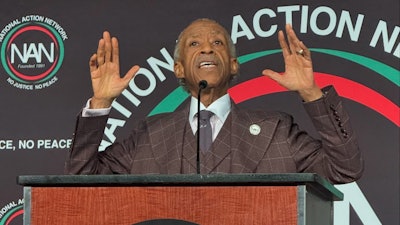 Reverend Al Sharpton
Reverend Al Sharpton
The National Action Network (NAN) is preparing to launch a nationwide boycott against PepsiCo if the company doesn't reverse its recent decision to eliminate diversity, equity, and inclusion initiatives within the next three weeks.
In a powerful letter sent to PepsiCo CEO Ramon Laguarta on Friday, Rev. Al Sharpton expressed "profound disappointment" that the company would abandon inclusion commitments that helped build its brand and fostered trust with millions of customers.
"You have walked away from equity," Sharpton wrote, arguing that removing DEI hiring and retention goals and dismantling community partnerships with minority organizations "are clear signals that political pressure has outweighed principle."
At the National Action Network Saturday Action Rally, Sharpton intensified his message:
"This morning at the National Action Network Saturday Action Rally, I gave PepsiCo 21 days. Not to think about it, to reverse course on walking away from DEI. We helped to build their brand. We won't fund our own exclusion. If they don't respond, we begin the boycott. We will not be silent while our dollars are used against our dignity."
Sharpton announced plans for a major demonstration on August 28th, the annual commemoration of Dr. Martin Luther King, Jr's 1963 "I Have a Dream" speech. "And on August 28th, we're taking it to Wall Street. From the African Burial Ground in the financial district, we will show them what economic power looks like. We're not asking. We're organizing. We're not your consumers. We are your conscience."
The boycott threat comes at a pivotal moment for PepsiCo. In a memo sent to employees in February, Laguarta announced the company would no longer set goals for minority representation in its managerial roles or supplier base.
At the NAN convention held over the weekend, a panel of academicians and journalists discussed the implications of corporate retreats from DEI commitments. The panel, moderated by Dr. Jamal Watson of Diverse: Issues In Higher Education who is a professor and associate dean of graduate studies at Trinity Washington University, included Dr. Michael Eric Dyson of Vanderbilt University, Christina M. Greer of Fordham University, Pulitzer Prize-winning historian Annette Gordon-Reed of Harvard (who is also president of the Organization of American Historians), and Natasha Alford of The Grio. The distinguished panel examined the historical context and potential consequences of corporations abandoning diversity initiatives under political pressure.
What makes this particularly striking is PepsiCo's historical position as a diversity pioneer. As Sharpton pointed out in his letter, in the 1940s and 1950s, PepsiCo hired some of the first Black sales and marketing executives in corporate America, and by the 1980s the company had created Black consumer advisory boards.
"You did this not because it was easy — but because it was right," Sharpton wrote. "That legacy is now in jeopardy."
Sharpton himself sat on PepsiCo's African American advisory board in the early 2000s, giving him personal insight into the company's previous commitments to diversity.
A boycott of PepsiCo wouldn't just affect supermarket shelves. It could send significant ripples across college and university campuses nationwide, many of which have exclusive contracts with PepsiCo to provide beverages and snacks.
These exclusivity agreements often provide substantial revenue for educational institutions, with PepsiCo products filling vending machines, cafeterias, and campus convenience stores. Many colleges rely on these contracts not just for the direct financial benefits but also for sponsorships of campus activities and athletic programs.
A successful boycott could force university administrators to choose between honoring student activism supporting diversity initiatives and maintaining lucrative corporate relationships. This potential conflict comes at a time when many academic institutions are already facing scrutiny over their own DEI policies. Several college presidents reached over the weekend have told Diverse that if a boycott goes into effect, they would consider canceling their contracts with the corporate giant.
Student activist groups across the country are likely to be energized by NAN's boycott, potentially organizing their own campus-specific actions targeting PepsiCo products. This could create pressure points at universities that have traditionally been centers for social justice movements.
PepsiCo's rollback of DEI initiatives is part of a concerning trend. Since President Donald Trump returned to the White House earlier this year, U.S. government agencies, companies, and schools have scrambled to reevaluate policies and programs aimed at increasing diversity among employees and reducing discrimination against members of minority groups, women, and LGBTQ+ people.
Trump ended DEI programs within the federal government and has warned schools to do the same or risk losing federal money. Large retailers like Walmart and Target have also phased out DEI initiatives since Trump took office.
What makes PepsiCo's position particularly notable is that it contrasts sharply with its major competitor, Coca-Cola, which recently reaffirmed support for its DEI efforts. In its annual report, Atlanta-based Coke warned that the inability to attract employees that reflect its broad range of customers could negatively affect its business.
"Failure to maintain a corporate culture that fosters innovation, collaboration and inclusion... could disrupt our operations and adversely affect our business and our future success," the company stated.
As NAN's deadline approaches, all eyes will be on PepsiCo's response—and the potential ripple effects across corporate America if one of the country's largest food and beverage companies faces a coordinated boycott over walking back its diversity commitments.
















